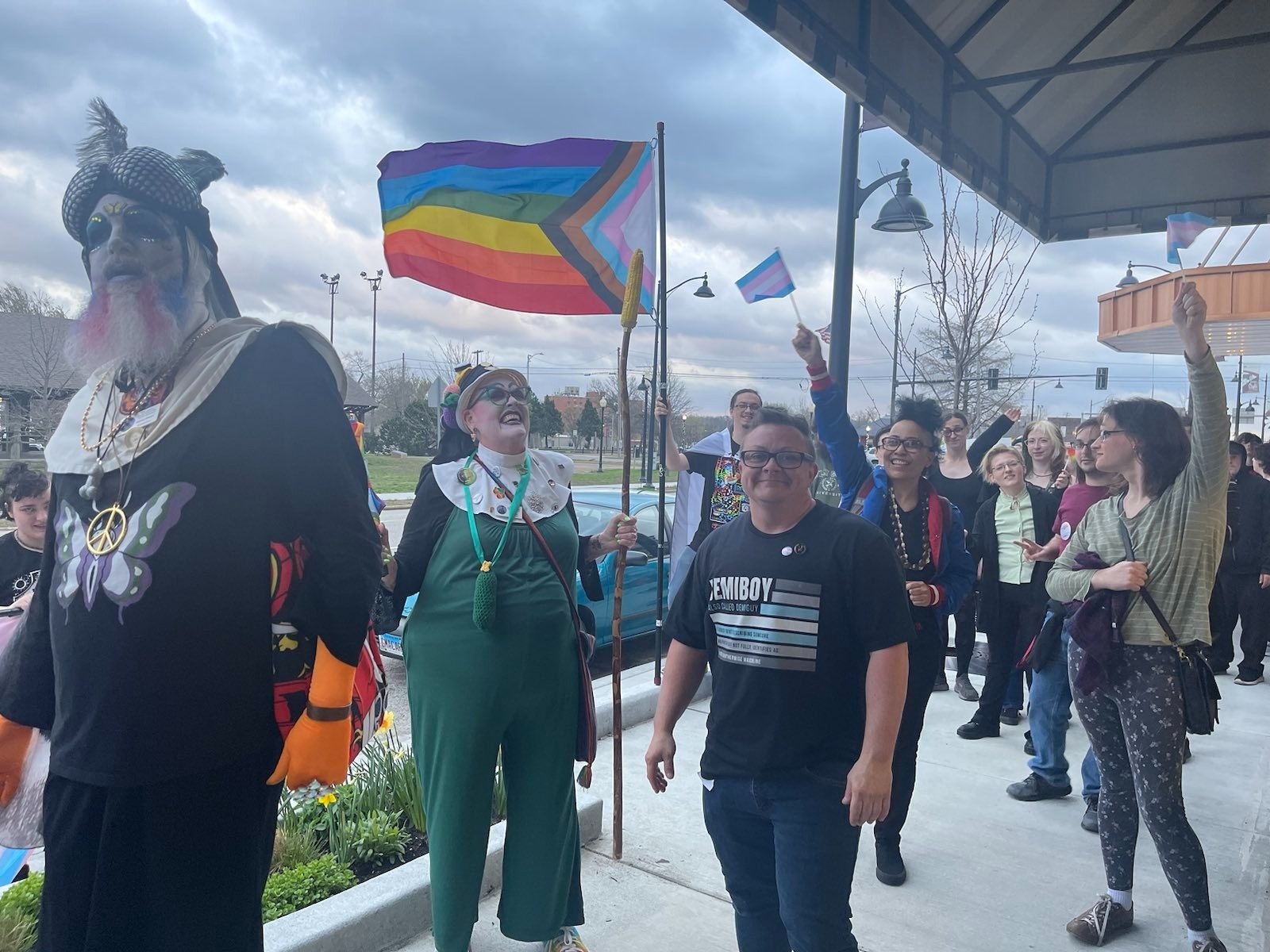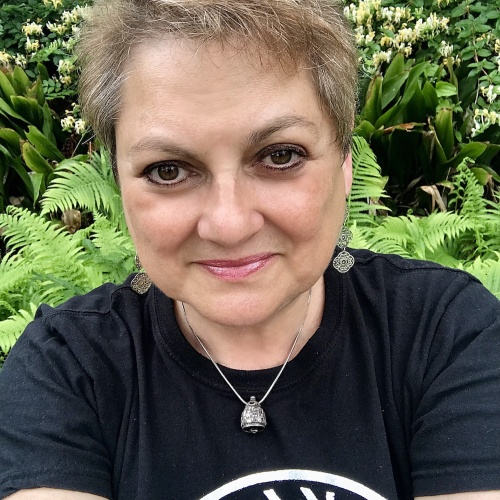Illinois town offers solidarity to gender migrants fleeing far-right tyranny in Southern states

A group takes part in Transgender Day of Visibility and the Southern Illinois Trans Resource Fair in Carbondale on March 31, 2023. The Illinois town's trans-welcoming reputation and resource groups like the Carbondale Assembly for Radical Equity have drawn transgender people from across the country, who are being forced to leave their home states due to anti-trans legislative policies and health care bans.
When the time came to leave Florida, Ellie Winter*, a 34 year-old trans woman in a lesbian relationship, couldn't bring her bed because a trailer couldn't be hitched to her car. Winter left it behind, along with a job she loved, a ton of close friends, and many happy memories.
Florida is where she'd met her fiancée, fallen in love, and gotten engaged. It's also where she faced her worst fears of persecution as a series of discriminatory measures — dubbed the "slate of hate" — were signed into law this spring: the infamous "Don't Say Gay" bill, health care and bathroom bans, attacks on gender and race curriculum, and the license to discriminate in health care.
"I was especially worried because I worked at a school and, with all the rhetoric and false accusations of all queer people being pedophiles, I didn't know who I could trust," Winter told Facing South. "Basically, I was like, 'I've got to get out of here.'"
Taking only their clothes, books, and guitars, and without much in their wallets or bank accounts, in June the couple flung themselves towards an unknown future in Carbondale, Illinois, a place they'd never visited. As much as they were fleeing danger, they felt themselves to be moving toward something positive — at the very least room to breathe. They'd chosen the college town of 21,000 at the edge of the Shawnee National Forest primarily because the Carbondale Assembly for Radical Equity (C.A.R.E.) would be there to receive them with open arms.
For C.A.R.E founders Cassandra Coffey, Carrie Vine, and Mattie Stearns, launching the group was essential to throw out a lifeline in the face of growing persecution and injustice. "I've definitely heard comrades in Texas and Florida saying they're digging in, they're not going anywhere, it's their home, and they're gonna fight it out," Stearns told Facing South. "But if you're a person who feels unsafe, get ahold of us. We focus on connecting people to community to figure out where to go (or not go), where to rent or buy a house, or find jobs. And we can do that all day long."
Right now, C.A.R.E is working with 16 "cases" through its organizational offshoot, Rainbow Refuge. They are mostly from Florida; others hail from Texas, Oklahoma, and Tennessee, according to Carrie Vine, one of C.A.R.E.'s founders and volunteer case managers. Across the country, states with bans on gender-affirming care are disproportionately located in the South. Groups like the Campaign for Southern Equality have established the "Southern Trans Youth Emergency Project," a regional response to anti-trans health care bans in the South, which includes supporting families with trans children through emergency grants for travel costs.
Demand for support from C.A.R.E is expected to surge as the far-right turns up rhetoric about "parental rights," its organizers say. In anticipation of further attacks on trans rights, at its July meeting, the Carbondale City Council unanimously enacted bodily autonomy and human rights ordinances. Clare Killman, the trans city council member who brought the ordinances forward, has called the city "the last hope for a lot of people in any one direction."
Self-help, mutual aid, and a joyful resistance
Cassandra Coffey is a 40 year-old trans woman who stands 6 feet 6 inches and whose voice is "like Dr. Girlfriend on the Venture Brothers levels of deep, despite years of transition and HRT [hormone replacement therapy]," she told Facing South. She came to Carbondale from Indiana in 2015 and found an oasis.
"I used to live in a really nice neighborhood in Evansville, and I could walk down to the corner store and back wearing a dress, no issue. But if I got into the middle-class Christian, God, guns, and Trump neighborhood, I didn't have quite the same experience," Coffey recalled. "Whereas here, walking around femme-presenting in Carbondale is safe."
The town's trans-welcoming reputation lured Winter and her partner, who made the 15-hour trip in a straight shot, fueled by energy drinks.
The first rush of emotion came when they crossed into Georgia. "I just remember feeling so elated when we got across the Florida border," Winter said. The second was driving though the Great Smoky Mountains; her fiancee had never seen mountains before. The third was when they reached the "Welcome to Illinois" sign. "We screamed a scream of relief, a letting go of the anxiety, but also all of the excitement of this is where we're going to be living now!"
They were met, she says, with "classic Midwestern hospitality," and soon found — with C.A.R.E.'s great help — housing, jobs, and community. As soon as they were settled, Winter jumped in to help others. "Now, I'm part of Rainbow Refuge's welcoming committee," she said. "I've never felt safer or more comfortable. Anywhere."
Coffey, a longtime organizer in radical queer spaces, says since the Supreme Court declared gay marriage legal in 2015, she knew a backlash against queer communities was coming. In an interview on Locust Radio, Coffey called C.A.R.E's organizing an "everybody-in-one-pot" kind of thing. "We identified the need, we pulled in resources. When we didn't have skills that were relevant, we found people who had them, and everybody just kind of works together," she explained.
C.A.R.E.'s inaugural meeting in April 2023 was propelled by a sense of urgency. Coffey had started seeing an acceleration of violent rhetoric in the far right-wing chat groups she's been monitoring for years. "They were talking about seeing the stages of genocide on a Holocaust Museum's posts and they'd be like, 'Hell yeah, let's bring it up another notch.'"
Of the 30 people who showed up to C.A.R.E's first meeting, 26 are still "very active," Coffey said. They meet monthly at the Rainbow Cafe LGBTQ Center. Security is paramount: They message over Signal's encrypted platform, and don't allow anyone on their Signal threads they have not met personally and vetted.
C.A.R.E. has hosted a series of successful events since its inception: a music fest and art auction, a brunch and variety show, and a few concerts, all to raise funds for mutual aid. Now they're starting to think bigger, and are hoping to entice Chicago-based trans punk star Laura Jane Grace to lend her support to Rainbow Refuge.
The group's persistent but low-key visibility has prompted unsolicited gifts. For example, Carbondale Starbucks Workers United held a Drag Bingo event in June and donated the proceeds to C.A.R.E., and a local grandmother of a trans teen spontaneously wrote them a check for $500. On Sept. 23, the touring troupe of performers named Fine and Bawdy Wenches will be throwing a pirate-themed pub crawl in honor of "Talk Like a Pirate Day," with proceeds supporting Rainbow Refuge.
Now's the time to get people saved
C.A.R.E and the Rainbow Refuge see their organizing as a method of building community and keeping one another informed, in a way that maintains responsiveness and doesn't get bogged down in organizational bureaucracy.
"To form the foundation for community defense, we actually have to get to know each other," Coffey said. "No invisible people. We have to establish lines of communication, and do check-ins, educate the populace on the issues and the importance of action."
Mattie Stearns, who is nonbinary, also takes a more-the-merrier approach when it comes to C.A.R.E and the Rainbow Refuge's work. "Now is the time to get people saved," Stearns told Facing South. "When you don't know what to do, get your friends together and start figuring out what you can do. Then someone else will be like, 'Oh, I think I can do something similar,' and things start to grow and gain synergy."
The group eschews rigid structure, preferring to act nimbly. From Stearns' perspective, the key question is: "If you had a trans kid who came up to you and said they felt unsafe, what would you do?"
For Kimberly Reynolds, a 39-year-old woman from Pensacola, Florida, and mom of an 11-year-old trans boy named Joe, this is not a rhetorical question.
"I know everyone obviously feels this way about their own child, but Joe is the light of our life," Reynolds told Facing South.
"They are unfortunately, an early bloomer, big-chested at 11. My kid is dealing with a pretty heavy depression, which is heartbreaking," Reynolds continued. "And now to feel like their state is stacked against them, and their school is stacked against them, that there's no protection, any of the teachers could call Joe [by their deadname] at any time, and they're already self-conscious."
When she posed to Joe the question of staying or leaving, Joe didn't hesitate. "Let's get out of here," they said.
They're hoping to be on their way to Carbondale by Christmas; they would have left earlier, but money's been the sticking point for the family of five. Reynolds had a baby seven months ago, and their nephew, also 11, lives with them, and will likely move, too.
"We are living below the poverty level. Honestly, I'm not working because of the baby," she explained. Childcare is too expensive, and while her husband, who is running a kitchen in a bar and restaurant, loves his job, his salary is modest. But they're determined, selling belongings and starting a GoFundMe to help them raise the money to move their household to Illinois. An Associated Press story from June found that, since the start of this year, individuals have given more than $200,000 to GoFundMe fundraisers started by trans people looking to leave Florida.
"Now that I made this decision on behalf of my child, I realized Florida has been oppressing me for a really long time," Reynolds said. "I hadn't realized how much state policies can differ."
In 2023, Illinois Governor J.B. Pritzker has signed protections for gender-affirming care into law, and also a state prohibition against library book bans and a mandate to teach Native American history in the public schools — all measures that Reynolds said are important to her.
But Reynolds said choosing Carbondale really came down to a single factor — C.A.R.E Co-founder Carrie Vine and her love for her city. Vine has passed on job leads to Reynold's husband, information about tuition at Southern Illinois University (where Reynolds hopes to earn a teaching credential), and, most importantly, reassurances about the heart of the place.
"The fact that there's a ready-made community there for my child, that there's a trans children's group — which is something I do not have here at all — I thought that would be really, really good," Reynolds said.
Reynolds said she will lean on Vine when it comes time to pick a neighborhood and to navigate the public school system. "It's so comforting to have that," she said. After pausing to take a deep breath, she added, "It's actually necessary to have that."
*The name Ellie Winter is a pseudonym.
Tags
Frances Madeson
Frances Madeson is a freelance movement journalist, feature writer, and author of the comic novel "Cooperative Village."
